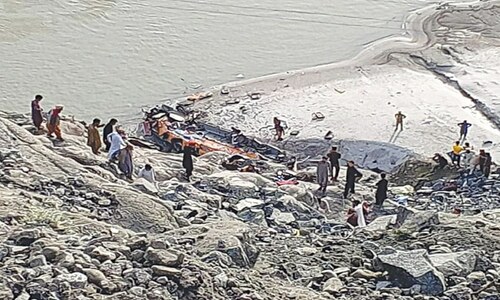ISLAMABAD: The army on Wednesday announced the initiation of a key countrywide urban counterterrorism operation, code-named Raddul Fasaad, to deal with the problem of resurgent terrorism in the country.
An announcement by the military’s public affairs wing — Inter-Services Public Relations (ISPR) — said the Pakistan Army had launched ‘Operation Raddul Fasaad’, which broadly means “elimination of disorder/mischief”.
The operation was initiated in the wake of a recent wave of terrorism that hit all four provinces, leaving over 100 people dead and countless others injured. The string of attacks raised doubts about the sustainability of the successes achieved through Operation Zarb-i-Azb and the over 26,000 intelligence-based and combing operations (IBOs) launched since.
The indiscriminate elimination of residual terrorist threats, the consolidation of gains made during counterterrorism operations so far and tightening security on the borders have been described as the main objectives of the new operation, which would be joined by all wings of the armed forces, paramilitary organisations, civilian law enforcement agencies and intelligence outfits.
Raddul Fasaad to target terror groups in Punjab, focus on ‘de-weaponisation’
The operation was announced after Army Chief Gen Qamar Bajwa chaired a security meeting in Lahore, which was attended by commanders of all military formations and intelligence agencies working in the province.

The new operation has four key elements: operations in Punjab; continuation of operations in other parts of the country; border management; and de-weaponisation and explosive control.
It is evident that the two main features of the new operation are the actions in Punjab and de-weaponisation.
“Pursuance of the National Action Plan (NAP) will be the hallmark of this operation,” the ISPR statement said.
Most previous military operations, except for the Rangers-led operation in Karachi, have targeted Islamist militants in the tribal areas, whereas IBOs and combing operations targeted groups and individuals associated with such elements. The IBOs were initiated to prevent a backlash from Operation Zarb-i-Azb in North Waziristan.
At least 10 major counterterrorism operations have been carried out by the army over the past decade, with Zarb-i-Azb being the last major undertaking against militancy.
Then-army chief Gen Raheel Sharif had announced in July 2016 that the “kinetic prong” of Zarb-i-Azb had been completed following the clearance of Fata right up to the border, and the busting of terrorist “linkages and networks”.
The bigger problem of extremist groups, however, was left behind as they went underground and differences with the civilian government at the time also impeded action against these elements. Operations in militancy-infested Punjab became a virtual ‘red line’ for the civilian government.
But the latest wave of attacks forced a rethink in civilian and political circles; whether the gains made so far could be sustained without addressing urban militancy, which feeds men, resources and logistics to the terror machine.
The civilian government’s nod for operations in Punjab — the traditional powerbase of the ruling Pakistan Muslim League-Nawaz (PML-N) — is seen as a major step forward in the country’s fight against terrorism.
Last year, Gen Raheel had unilaterally ordered an operation in the province after a bombing in Lahore claimed dozens of lives on Easter Day. However, he had to back down due to pressure from the civilian government, which was not ready to provide the necessary legal cover.
The agreement has come as a result of compromises, according to a leaked copy of the notification of Rangers’ deployment in the province.
The exact terms of the 60-day deployment are yet to be made public, but the notification reveals that Rangers will not be independent in their actions and will remain at the disposal of the apex committee, headed by Punjab Chief Minister Shahbaz Sharif, which would approve all operations to be undertaken by the paramilitary force.
Similarly, the Rangers mandate has been restricted to ‘terrorist groups’, whereas the proposal for action against ‘banned organizations’ was shot down by civilian authorities.
The military will not be able to release information about Rangers operations to the media, as per the leaked notification, and the focal agency for this purpose would be the provincial government’s public relations department.
Perhaps this was why the army chief’s meeting in Lahore was also attended by the Punjab government’s director general of public relations.
Published in Dawn, February 23rd, 2017














































Dear visitor, the comments section is undergoing an overhaul and will return soon.